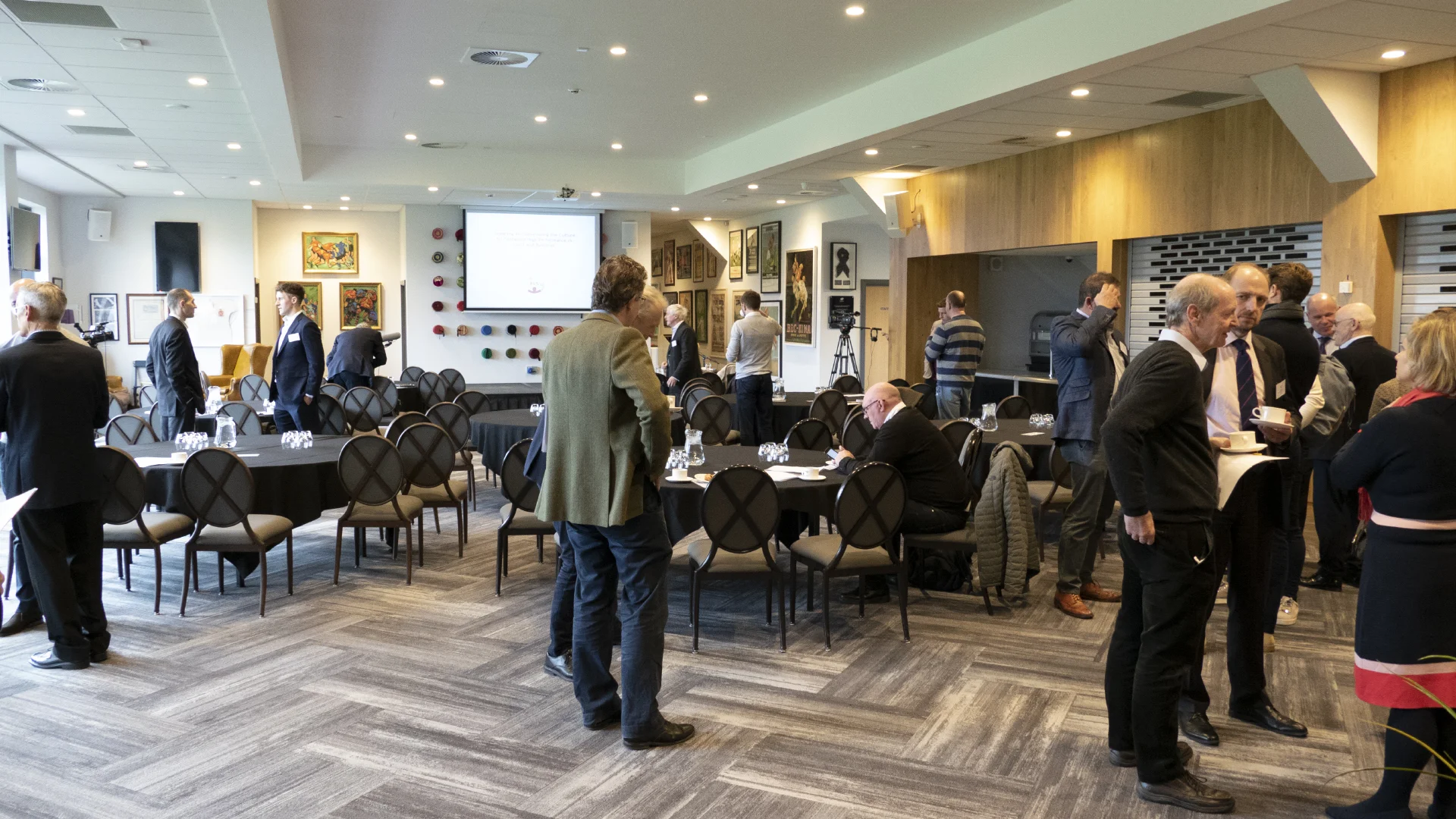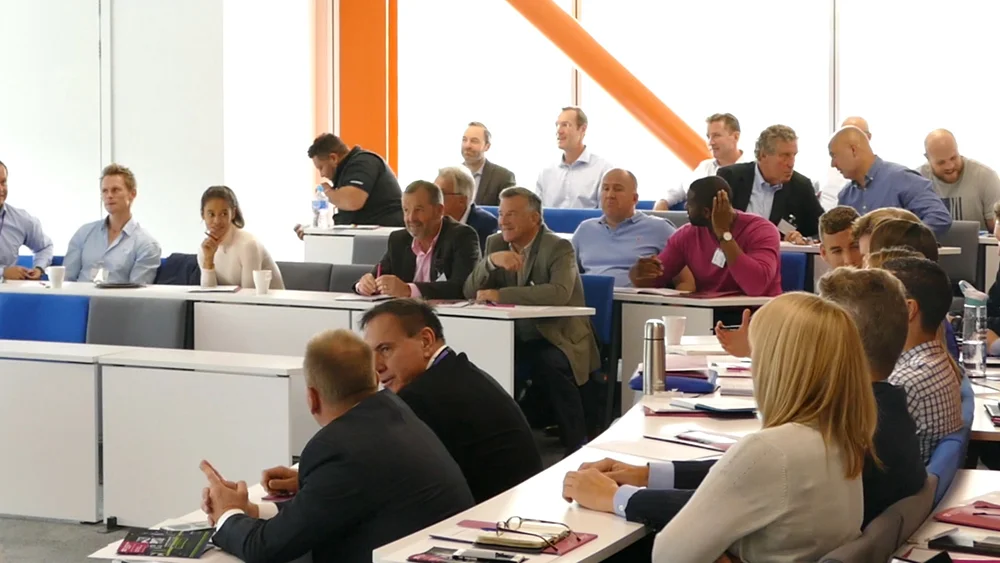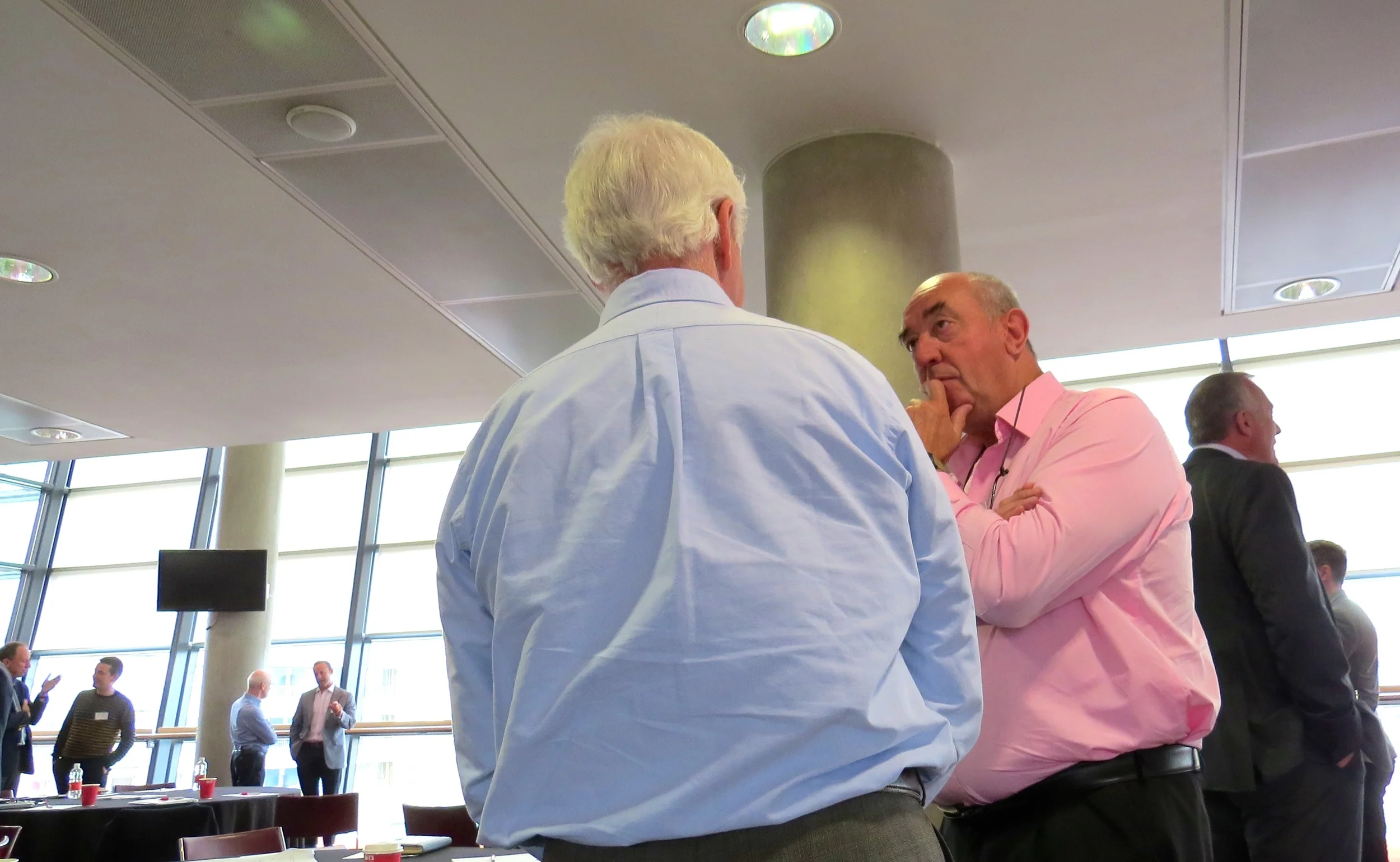FLS - Saracens Rugby Club
The workshop at Saracens gave Nigel Wray, Director of FLS, the opportunity to show delegates some of his remarkable sporting memorabilia collection. This is said to be the largest and best such collection in private hands in the world.Nigel, the Chairman/owner of Saracens, has a selection of his collection on display at the club.
Workshop at Accolade Wines, Bristol
The theme of this workshop was ‘Creating and Developing the Culture for Sustained High-Class performance in Sport and Business’.
Accolade Wines is not well-known by this name, but the company owns many pf the most famous Southern Hemisphere brands such as Hardy’s and Kumala. It is the biggest wine distribution centre in Europe, filling, capping, labeling and packing one million bottles every day. What is hugely impressive about the company is the employee engagement, along with the vision and purpose which appear to be understood and supported by staff at all levels. The morning was spent finding out about Accolade, initially via Richard Lloyd the General Manager and then via a guided tour, during which delegates had the opportunity to talk with many members of staff.
The afternoon was richly rewarding, with inspirational presentations from Pat Lam, Head Coach at Bristol Rugby and from Jess Thirlby, Anna Stembridge and Eboni Beckford-Chambers of Team Bath Netball. They all provided inspirational stories regarding their journey towards creating the culture they seek in order to be leading clubs in their field.
England rugby coaches Russell Earnshaw and John Fletcher provided an entertaining vision for creating a learning culture for long term involvement and enjoyment of sport.
September 15, 2nd Annual Conference
Loughborough University’s Olympic Park campus was again the setting for the LUL/FLS conference. This year’s theme was ‘Staying at the top- Challenging from the Front’.
A distinguished group of experts from sport, business and the military provided an entertaining and informative day. Keynote speakers were Danny Kerry, coach of the Olympic gold medal winning Womens Hockey team, and England Rugby coach Eddie Jones.
They provided insights into the issues associated with sustaining success.
Other contributors included Chris Casper, Sporting Director of Salford City FC, Kate Richardson-Walsh, GB Hockey captain, Sarah Hunter, England Rugby captain and Premier League rugby player, George Robson.
From the worlds of military and business we had Lt Col Lucy Giles (Commander New College Sandhurst), Andy Cosslett (RFU Chairman), Harry Keogh (Managing Director Coutts Bank), Richard Gray (Commercial Director, Grays of Cambridge).
Leading to sustained success with a high-performance culture by Vic Luck, Director, FLS
Following a successful and stimulating conference in September at Loughborough London University, (‘Staying at the top- Challenging from the front in Sport and Business’), this new article by Vic Luck proposes a model for the development of a high performance culture.
New Website
FLS members and followers may enjoy taking a look at a new website- www.sport500.co.uk . A variety of contributors pen interesting pieces, all no more than 500 words in length.
Learning to Lead
Learning to Lead
The majority of sports coaches, when asked about their purpose, would say something like ‘to improve players (or teams) and to be successful.’ Some coaches of youngsters might add ‘to have fun’. Few would refer to improving them as people or developing leadership qualities.
I know, because I have run many workshops for coaches and asked the question.
I follow this up by asking whether, if leadership development was a stated purpose, would it require them to coach differently. Most agree that it would. We then go on to consider this more deeply, often beginning with examples of leadership being found wanting in high level sport that we witness.
We are not very good at producing leaders in our major sports. If we were, we may not have so many foreigners in leading coaching and administrative roles. It all goes back to how teachers and coaches operate, from school to club to country.
Coaches are leaders. They are instrumental in bringing about change. They are experienced and knowledgeable. They are important. Far too often, they coach using didactic methods, whereby the athlete is a passive recipient of information and instructions. The coach does most of the talking at half time, injury breaks, team talks and in practice sessions. The typical coach is very good at developing a group of willing followers.
Of course, when thought of in this way, it is clear that most coaches need to change. They should coach in such a way that players become more skilful in decision-making and understanding their sport. How is this achieved? In a nutshell- by asking and listening. Encouraging players by asking them what they think, what needs working on, and even getting them to run sessions, is a start.
It sometimes needs a brave move on the part of the coach. Stuart Lancaster, a fine man who in many ways did a splendid job with England Rugby, was once asked what proportion of the practices were coach or player led. He said it was 70-30 coach led. When asked why the players did not do more, he said that the coaches did not think the players were ready for it.
I organised a conference las year on coaching sport to develop leaders. Brian Ashton made a fascinating contribution. He showed a picture of some youngsters in the 1950’s, satchels over shoulders, kicking a football on the way down the street to school. He said he had done that, and whenever possible, he and his pals would organise a game, in street or playground. They would select their own teams, decide on the rules, whether it was a goal or not, and make changes if it was not a good game. At the age of 6, Brian said they were organising their own sport, and then, tellingly, that over the next 30 years, people took that away from them.
I hope this sets you, the reader, thinking. In future articles, I hope to go a bit further into how to coach to develop leaders. It is important.
Bob Reeves
Forthcoming Conference
On September 15th, FLS will be jointly hosting with Loughborough in London, the Second Annual Leadership through Sport Conference. It will take place at Loughborough’s London campus in the Olympic Park.
The particular theme of this year’s conference is-
‘Sustaining Success- Challenging from the Front’.
Taking part will be an array of leading figures from sport, commerce and the military. These include Eddie Jones (England rugby), Danny Kerry (GB Womens hockey), Kate Richardson-Walsh (GB Womens hockey), Toni Minichiello (Athletics), Harry Keogh (MD Coutts Bank), Richard Hytner (ex Saatchi and Saatchi, now founder of ‘Beta Baboon’).
Full details will be announced at the end of May. Any FLS members wishing to be placed on a reserve list should contact liz.reeves@flsport.net.
Rugby Coaching Conference
FLS is playing a leading role in a rugby coaching conference being held at Oxford University on May 28. The general theme concerns coaching to develop leaders and encouraging better decision-making on the field.
Bob Reeves, Director of FLS, will head a workshop on coaching, and the legendary French player and coach, Pierre Villepreux, will take a practical session which will explore and demonstrate his renowned coaching philosophy. Lynn Evans, experienced coach at club and university, renowned for his approach to coaching skills, will also be taking part.
Any FLS member wishing to attend should contact Joe Winpenny-
FLS looking forward
In the Spring we will be holding more of our successful workshops. One of these will be a review of the Olympics, with contributions, we hope, from UKSport and some of those who took part. More information in the near future.
Thinking back to the Olympics
Our young FLS leaders were prominent in Rio.
Georgie Twigg was a member of the Womens Hockey team that won gold. There were terrific signs of leadership and team spirit in the group of players and coaches.
Tom Mitchell was captain of the Rugby Sevens team. They had a terrific tournament, but the final, against Fiji, was perhaps a game too far.
The Olympics demonstrated again the value of planning, and having the right people in key positions. Funding helped a lot of course, but the success of the swimming team, after a pretty dismal London Olympics, demonstrated that it is not all abut money. After a successful Beijing Olympics, swimming was on a high. Over the next 4 years, however, they never once met the targets set by UKSport. Indeed, 6 months before the Games in London, Baroness Sue Campbell (then Chairman of UKSport) told me that they were in for a terrible shock, predicting a poor Games for the swimmers. This is indeed what happened. Having subsequently been warned of reduced funding unless changes were made, a new Performance Director, Chris Spice, came in, the system was changed, and they went to Rio with confidence, ending up doing better than in Beijing, eight years earlier.
Key factors it seems to me-
-Have the right people in the right place
-Develop leaders throughout the system
-Address what is needed for top class performance and leave no stone unturned in doing what is necessary.
-Learn from mistakes
Some of this is addressed in Matthew Syed’s latest book, a must for sporting leaders- ‘Black Box Thinking’.
Bob Reeves
‘Developing Leaders in and through Sport by exploring innovative approaches to coaching’
I have to say what a great day I had on Thursday, I didn't want it to end! Loughborough Uni in the Olympic Park is such an excellent venue,. It was a great experience for me to explore this campus and learn whats on offer.
All the Speakers and Panelists fulfilled my expectations and more.
It is a great help to us in the Polo World to get access to such gatherings and please include us in the future.
I will be joining the Leadership in Sport Foundation so I hope to see you again soon. JD
Emotional Intelligence and Performance workshop at the Emirates Arsenal Stadium
Breakout session
Thanks to David Whitaker a stimulating and fast pace day leaving everyone with plenty to talk about!










